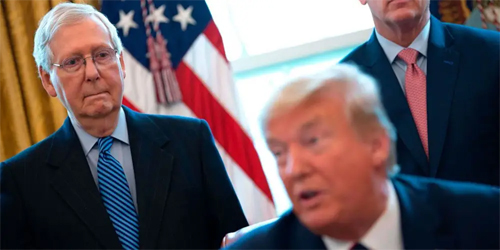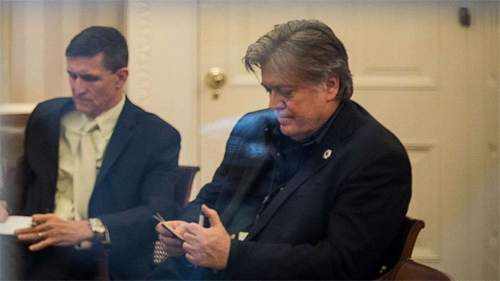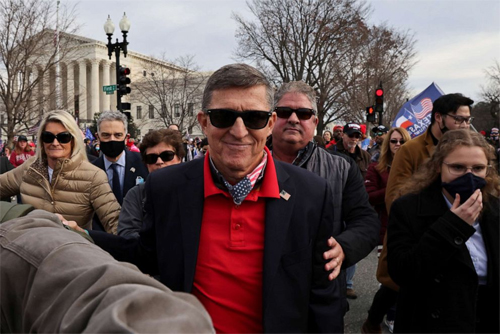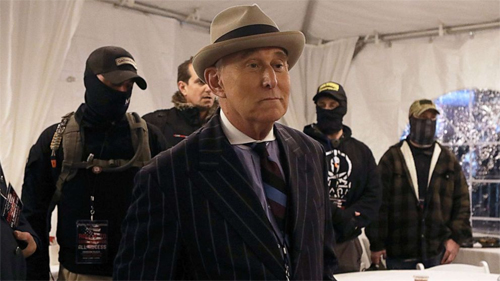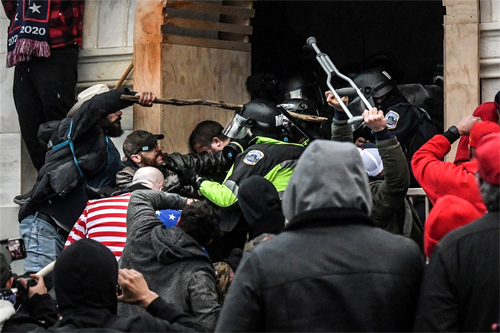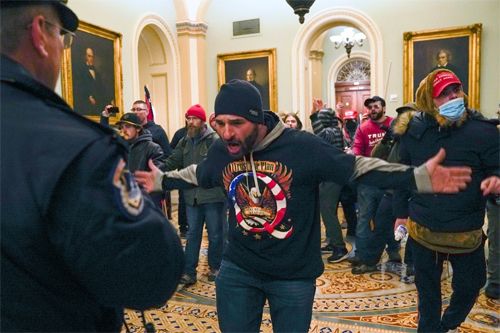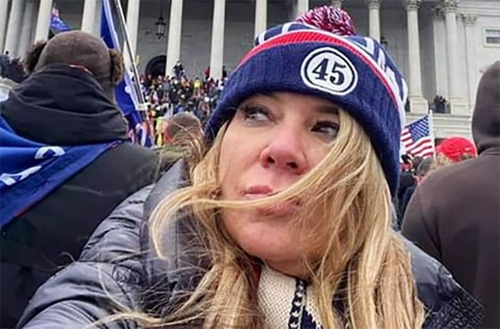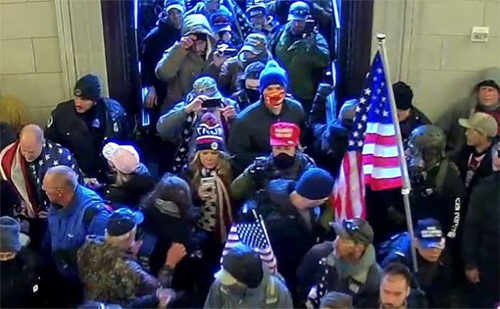by Amy Goodman
DemocracyNow.org
JANUARY 13, 2021
NOTICE: THIS WORK MAY BE PROTECTED BY COPYRIGHT
YOU ARE REQUIRED TO READ THE COPYRIGHT NOTICE AT THIS LINK BEFORE YOU READ THE FOLLOWING WORK, THAT IS AVAILABLE SOLELY FOR PRIVATE STUDY, SCHOLARSHIP OR RESEARCH PURSUANT TO 17 U.S.C. SECTION 107 AND 108. IN THE EVENT THAT THE LIBRARY DETERMINES THAT UNLAWFUL COPYING OF THIS WORK HAS OCCURRED, THE LIBRARY HAS THE RIGHT TO BLOCK THE I.P. ADDRESS AT WHICH THE UNLAWFUL COPYING APPEARED TO HAVE OCCURRED. THANK YOU FOR RESPECTING THE RIGHTS OF COPYRIGHT OWNERS.
GUESTS
Timothy Snyder, author, professor of history at Yale University and fellow at the Institute for Human Sciences in Vienna.
LINKS
Timothy Snyder on Twitter
"The American Abyss: A historian of fascism and political atrocity on Trump, the mob and what comes next"
"On Tyranny: Twenty Lessons from the Twentieth Century"
"Our Malady: Lessons in Liberty from a Hospital Diary"
As the House votes to impeach President Trump, the FBI warns there could be a repeat of the violent insurrection he encouraged on January 6, with Trump loyalists planning to hold armed protests nationwide ahead of Joe Biden’s inauguration. We speak with Timothy Snyder, a historian of fascism, who says the riot at the U.S. Capitol was “completely and utterly predictable” given President Trump’s record of stoking extremism and undermining democratic institutions. “The American republic is hanging by a thread because the president of the United States has sought to use violence to stay in power and essentially to overthrow our constitutional system,” says Snyder.
Transcript
This is a rush transcript. Copy may not be in its final form.
AMY GOODMAN: Well, history is being made today in Washington, D.C., as the House is voting to impeach President Trump for a second time. That’s one week after he encouraged a violent mob to “fight like hell” and attack the Capitol as members of Congress voted to ratify Joe Biden’s Electoral College victory in the 2020 election. The deadly siege so enraged Senate Majority Leader Mitch McConnell that he’s now reportedly privately backing impeachment, along with a growing number of Republicans, including Congressmember Liz Cheney of Wyoming, the third-ranking Republican in the House. On Tuesday, Vice President Pence rejected a call from the House to invoke the 25th Amendment to the Constitution to remove Trump from office.
Meanwhile, several Republican lawmakers bypassed metal detectors to enter the House floor that were installed after last week’s deadly attack, including the newly elected Colorado Republican QAnon supporter, Congressmember Lauren Boebert, who vowed in a viral video to carry a gun in the Capitol.
Far from the commotion, President Trump surrounded himself with supporters during a visit to the border wall in Alamo, Texas. In his first public appearance since the violence at the Capitol, he continued to deny any involvement with or responsibility for the violent insurrection.
This comes as The Washington Post reports the FBI explicitly warned of violence and “war” at the U.S. Capitol in an internal report issued one day before last Wednesday’s deadly Capitol invasion, and police officers from Seattle to New York are under investigation for participating in storming the Capitol, along with members of the New York Fire Department and apparently seven Philadelphia transit police officers. Two Black officers who defended the Capitol during the attack confirmed to BuzzFeed News that some of the insurgents they came face to face with were off-duty cops. Others were reportedly former military servicemembers. On Tuesday, the Joint Chiefs of Staff sent a reminder to members of the armed forces that, quote, “The rights of freedom of speech and assembly do not give anyone the right to resort to violence, sedition and insurrection,” unquote.
The FBI has opened some 170 cases on individuals involved in the assault and says hundreds more will be opened in the coming weeks. Over 70 people have been charged so far.
Now the FBI is warning Trump loyalists plan to hold armed protests nationwide ahead of Biden’s inauguration next week. Screenshots of archived content appear to show plans for mass armed actions in Washington, D.C., this weekend.
For more, we’re joined by Timothy Snyder, professor of history at Yale University, fellow at the Institute for Human Sciences in Vienna, where he now joins us from. He is the author of several books, including On Tyranny: Twenty Lessons from the Twentieth Century. His new essay in The New York Times Magazine is headlined “The American Abyss: A historian of fascism and political atrocity on Trump, the mob and what comes next.”
Professor Snyder, welcome back to Democracy Now! We are glad that you are physically doing well. We’ll talk about that later. But let’s talk about what happened. From your vantage point in Vienna, Austria, if you can talk about what you watched last week and why you see race at the core of this Trump-inspired insurrection?
TIMOTHY SNYDER: Right. I mean, number one, it’s kind of you, Amy, to mention the article. The reason why I could publish a big article about this part about the coup attempt right after it happened was that this was completely and utterly predictable. I already had the article drafted before the 6th of January because it was obvious to me what was going to happen. And so, I just want to underline the points you were suggesting earlier about just how strange it was that this kind of thing could happen so easily.
As to race, I mean, this is a classic historian’s point. The point I make in the article is about the big lie. You know, I say that these are the kinds of things that happen if a charismatic leader with a big megaphone, with a lot of reach, is able to consistently tell one thing which is simply not true, but which deeply matters, like, for example, I won an election that I lost. That has to lead to violence. But as you rightly suggest, the big lie has to be rooted in a particular society. And in the United States, the big lie is going to be rooted in race. Let’s count the ways.
Number one, what Mr. Trump is saying, when he won the election, is that there was fraud. And by fraud, he means the reality that African Americans are allowed to vote. When he speaks in Milwaukee or Atlanta or Detroit, what he’s saying is Black voters, right? When he’s saying, “I won,” he’s saying, “I won if you only count the votes of the real Americans.”
Number two, think of Senator Cruz and his invocation of 1877. As every historian of the U.S. knows, and as lots of African Americans know, but maybe not everybody knows, the Compromise of 1877 is the very moment when the American South was allowed to build up a basically American apartheid. The Compromise of 1877 is what allowed American states to push African Americans away from the voting booths and into a Jim Crow condition, which was going to last for nearly a century and which we’re still dealing with today.
Number three, look at the people who actually invade the Capitol. These are — and this has not been covered enough, this has not been hit hard enough — these people are basically white supremacists. The white supremacists are leading, right? They’re leading the way, and they’re making the argument that “this is our house.” In other words, what we think is that American government should be in the hands of white people who are willing to be violent about Black people.
JUAN GONZÁLEZ: But, Professor Snyder, I wanted to ask you, in terms of — you characterize it more as an attempted coup than perhaps maybe insurrection, because a coup assumes that there was an actual — it seems to me, an actual plot afoot by the coup makers. And in this situation, it appears to be that Trump egged on the mob, clearly, and that it seems to me there’s always been a right-wing, fascist movement in the United States in search of a leader. I mean, if you go back to Father Coughlin in the '30s, Huey Long, George Wallace, there's always been a significant portion of the American population that has lent itself or seen itself in right-wing and anti-democratic terms. And now they actually have a leader in the White House. So, to what degree was this really an opportunism that Trump took advantage of to unleash the mob, as opposed to a coup, where military leaders or key officials got together to plan an overthrow?
TIMOTHY SNYDER: Yeah, I take that point. I mean, I would emphasize, Juan, that it’s important that we not get too lost in definitional disagreements about whether we’re going to say “coup” or “putsch” or “insurrection.” The American republic is hanging by a thread because the president of the United States has sought to use violence to stay in power and essentially to overthrow our constitutional system. There’s broad agreement about that.
I’ve been calling it for a coup for a long time, actually, I mean, for months, for the following reasons — or a coup attempt, to be precise, because it’s been clear for a long time, because Mr. Trump has said so himself, that he intends to stay in power after losing the election. That’s been his language for more than six months. He has been trying to bring the military into it. That was clear on June the 1st, Lafayette Square. And it’s also clear from these repeated statements, from today, the Joint Chiefs of Staff; a few days ago, the 10 former secretaries of defense. The reason why these people have to make these statements is that they’re aware that Mr. Trump is trying to get or has a certain amount of support in the military, right? So, it’s a coup attempt, in my view, because Mr. Trump has said he was going to try to change the nature of the American regime, and he’s been trying to use instruments inside American institutions.
Now, beyond that, I would point out that this wasn’t just a mob. I mean, as you know very well and as you just said, these aren’t just people who happened to be there. These are several different kinds of white supremacist and extreme right-wing paramilitaries who are appearing at the Capitol. They are getting mixed in now with members of the police. And this is extremely dangerous, because it’s that mixture of outside-the-state, outside-the-law paramilitaries and police forces, or policemen who start to go over on the other side, which is very characteristic of the way fascist regimes come to power.
JUAN GONZÁLEZ: Yeah, I wanted to follow up specifically on that issue of the military, because, obviously, those who know the history of the rise of Hitler know that a lot of his base was embittered and disillusioned veterans of World War I who felt that they had been unjustly treated or had no economic opportunities under the Weimar Republic. The United States military today is 40% people of color. To what degree are the progressives of this country not paying enough attention to actually organizing and reaching out to the enlisted troops of our country in terms of what’s going on? Because, clearly, back in the days of the Vietnam War, it was organizing among the military that really finally convinced this government that they could no longer continue to move forward with the war.
TIMOTHY SNYDER: That’s a really interesting question. I mean, I think, looking back at the last half-century, 60 years of U.S. history, the integration of the military is one of the most significant things that happened, not just in terms of obvious justice — you know, as everyone knows, we fought the Second World War against racism with an Army which was organized by race — but not just ethically, but also politically. I mean, before even getting to the point that you’re making, I think it’s very much the case that the commanders of our armed services are perfectly aware what it means to have integrated services. It means that any kind of attempt to get involved in politics in a Trumpian way would be extremely divisive. But it also means that people in the military, perhaps more than other walks of life— or, to be specific, white people in the military, perhaps more than other walks of life, are actually in contact with, and sometimes share points of view of, folks who have different backgrounds and different experiences than themselves.
I would agree completely with your point. I mean, it’s not always easy to be in contact with people who are in the military. They could be overseas. They could be on a base. But I certainly take your point that folks on the left sometimes have a certain tendency to pigeonhole all institutions and miss some openings.
AMY GOODMAN: I wanted to ask you, Professor Snyder, about who was involved in this attack. Some have called it the “Coup Klux Klan.” That’s C-O-U-P, Coup Klux Klan. And you make no apologies about referring to white supremacists leading this. Let’s talk about the military and police involvement. It’s just coming to light right now. It looked like this sort of disorderly array of people who took an opportunity last week. But now as more and more video is coming out, it may well be that the frontlines were quite well ordered, and now this latest news that the Seattle police were involved, that New York police officers were involved, that Philadelphia transit officers came down en masse, that a PSYOPS person, at least one, was involved, psychological operations. Talk about this.
TIMOTHY SNYDER: OK. Well, I mean, number one, when we talk about the coup plotters, just to make the obvious point, the most important is Donald Trump himself, who has been creating an — he’s been creating the psychological and the moral environment that makes this possible by telling a big lie in which he is a victim and people who voted for him are victims.
I think, in the second rank, we have to put Senators Cruz and Hawley. It’s extremely important that these senators decided to make of January 6th a kind of carnival of mendacity, in which they were going to exploit their official position in order to tell the big lie, in an occasion which should be formal and solemn. I think that makes them the second ranks of the plotters.
Number three, as you say, there was a good deal of organization taking place. And the Anti-Defamation League and other nongovernmental organizations were tracking this but not able to get very much of a hearing, it seems to me, from government institutions. I mean, as a spectator from a long way away, it was obvious to me, as I say, that something like this was going to happen.
I think, Amy, what follows from this is that in this interval between impeachment, which is going to now happen, and a trial, which I’m going to bet is going to happen after Biden’s 100 days, there should be something like an independent blue-ribbon commission of forensics experts, digital forensics experts, historians, national security people, lawyers and activists, who put together a beautiful and organized and fact-based report about what happened, so that three months from now when there’s a Senate vote, which I believe there will be, there will also be this document that makes it clear how people should vote, but also a document which can go down in history, because, I mean, other days in infamy, compared to this one, don’t compare. I mean, this, the January putsch, is the day in infamy which we have to get right for historical purposes. If this becomes a myth of victimhood, if this becomes, as Mr. Trump says, something we should treasure, then the country is in trouble. We need to get the facts right and the history right and the story right on this one.
JUAN GONZÁLEZ: And, Professor Snyder, where do you see the Republican Party and Donald Trump going after Biden is inaugurated? Clearly, the party had hitched its star to Trump, and now there is enormous upheaval within it in terms of the road ahead.
TIMOTHY SNYDER: Yeah, I mean, not many people think this, but, you know, I’ll go out on a limb and say it: I think it’s going to be hard for Mr. Trump to continue to reside in the United States of America. He has a lot of debt, and he’s facing — even before the 6th of January, he was facing a number of criminal charges — or, not facing directly, but being investigated for a number of criminal charges in New York. I think it’s going to be hard for him to keep his feet in the United States of America. Perhaps I’m wrong.
As for the Republican Party, I mean, my way of seeing it, as I lay out in that article, “American Abyss,” is that the largest group of Republicans are people that you could call the gamers, the ones who work the system with the gerrymandering, with the dark money, with the voter suppression, who are in favor of the, quote-unquote, “democracy” that we have in America now, the unfortunately very limited democracy we have, because they know how to work it.
Then there’s a smaller faction, which in the article I call the breakers. Those are people like Trump or Cruz or Hawley, who have understood that one could actually come to power in the United States by entirely nondemocratic means, by way of the mob, by way of throwing an election and lying about it. And I think that faction is going to be there.
Then there’s a third, still smaller group, which you could call the honorable few, the people who have positions that I might disagree with, but who believe in the rule of law and who believe in telling the truth — right? — like Kinzinger or like Cheney or like Mitt Romney.
I think the interesting thing to watch for is whether the center of power in the Republican Party now shifts from being the breakers and the gamers together to being the gamers and the honorable few together. I think that’s now likely to happen. And it would be, frankly, a very good thing for the Republican Party, because the Republican Party, by way of generations of voter suppression, has now got itself into a cul-de-sac. It’s got itself into a dead end, where what’s happening now is, honestly, the only thing which can happen. If you don’t try to win campaigns with policy, but you try to win them by gaming the system, eventually there are going to be people who say, “Hey, let’s not game the system anymore. Let’s just break the system.” And that happened in January 2021. And there’s nowhere to go from there except further down into chaos and blood. So, I think — I mean, the Republican Party is not my party, but I think this is an opportunity for them to regroup. And I hope a number of them will see it that way.
AMY GOODMAN: So, let’s talk about what’s going to happen in the coming days, what you expect, the word of all 50 capitals, state capitals, deeply concerned about attacks, the FBI warning about those attacks right through Inauguration Day. Then you have congressmember — as you mentioned, third in line in the House Republican leadership, Congressmember Cheney, who said, “There has never been a greater betrayal by a President of the United States of his office and his oath to the Constitution. I will vote to impeach the President.” Many are asking why it took her so long. But then, privately, McConnell speaking with Biden and working out what would happen. Like, today he will be impeached by the House. But then a trial could determine — if they convict President Trump, they could decide the sanctions, like he can never run again for public office or for president, could end the pensions and the millions of dollars — people don’t realize former presidents get that kind of thing — but working out this bifurcation deal, where Senate will work both on approving Cabinet members but then also holding a trial, whether it goes from the leadership of McConnell to the leadership of Schumer. Can you explain what will be taking place and if you expect this time, unlike last time when Trump was impeached, that he will be convicted in the Senate?
TIMOTHY SNYDER: No, you know, you’re asking a historian. I’m just going to answer as an American who doesn’t know any more than you do, probably a lot less. I mean, my gut feeling about this is that it works very well for both Joe Biden and Mitch McConnell to have impeachment now and trial after a hundred days of Biden.
It works very well for Biden, because he’s got a hundred days of stuff that he really needs to pass, and he needs to get his appointments made as quickly as possible, especially after this terribly chaotic transition.
It works well for McConnell, because it gets Republicans out of the heat of the moment, gives them some time to think about what happened. Right now, of course, Mr. Trump is very popular. Three months of Twitter silence, he probably will be less so. Probably some other things will happen in the meantime to make him less popular.
I mean, for me, as a historian, for someone who’s concerned about facts, a very important element of this is, in three months, we could have a really good, nonpartisan, expert-based investigation of what happened in the Department of Defense, in Homeland Security, in the FBI, in police departments and on Capitol Hill that day, a report which could then be used in April, or whenever, when the trial happens, to make sure that people see, at least people of any amount of reasonability see, that what’s happening is a trial based upon the finding of fact, and not some kind of emotional, partisan exercise.
So, I can see how both sides have an interest in working it that way: impeachment now and a trial later. And yes, I think the Republicans — what I feel is that the Republican gamers, as I think of them, I think they’re shifting towards conviction. I think conviction is now a reality.
AMY GOODMAN: And finally, I wanted to ask about your new book, Our Malady: Lessons in Liberty from a Hospital Diary. In it, you write, “The word freedom is hypocritical when spoken by the people who create the conditions that leave us sick and powerless. If our federal government and our commercial medicine make us unhealthy, they are making us unfree.” Since we last spoke, Professor Snyder, you almost died, on New Year/Christmas Eve in 2019. If you can link what happened to you then, and describe what happened, to what we’re seeing — this was pre-pandemic — today?
TIMOTHY SNYDER: Well, I think there’s a big misunderstanding in America about what freedom is. And you can see that in the behavior and comportment of a lot of the people who stormed the Capitol. A lot of us seem to think that freedom is just about believing whatever we want to believe, even if it’s not true, and freedom is just about acting on our impulses. We don’t seem to understand that you can’t really be a free person unless there’s some factual world that you share with other people. We don’t seem to understand that you can’t really be a free person unless there are values that you can talk about out in the world.
One of the things which has been clear for a long time in the U.S., and it’s only been clearer — it’s even been clearer in the last year, is that if you deny people healthcare, you’re making them less free. If you put people in unnecessary risk and make them more subject to disease or the fear of disease, you’re making them less free. You’re also making them more vulnerable physically and mentally to various kinds of demagoguery.
So, what happened on January 6th is partly the result, I would say, of a sick country. When you look at the people who carried this out, I mean, when you have a hard look at their comportment, at their faces, at the way they carried themselves, I mean, apart from all moral judgments, you’re not looking at a healthy society there.
So, I think part of the renewal of American freedom in 2021 has to be the concept that we all have health as a human right, that Americans, people living on this territory of the United States of America, should have access to health as a human right, that health is one of the things that should come before profit. If we do that, we’ll not only feel better and be freer, we’ll recognize each other better as Americans, because we’ll be sharing in this together. So, that’s a way to bring it together. Thanks for the question.
AMY GOODMAN: Well, thanks so much, Timothy Snyder, and thank God you recovered from your appendicitis, misdiagnosed, from where you were to right here in the United States. Timothy Snyder, Yale University professor, fellow at the Institute for Human Sciences in Vienna, Austria, where he’s speaking to us from. He’s got the cover story of New York Times Magazine, “The American Abyss: A historian of fascism and political atrocity on Trump, the mob and what comes next.” We will link to it at democracynow.org.


